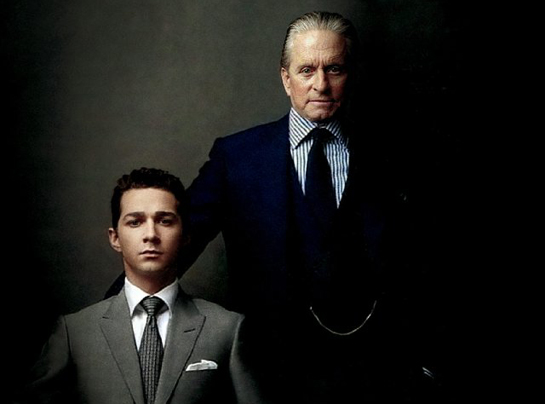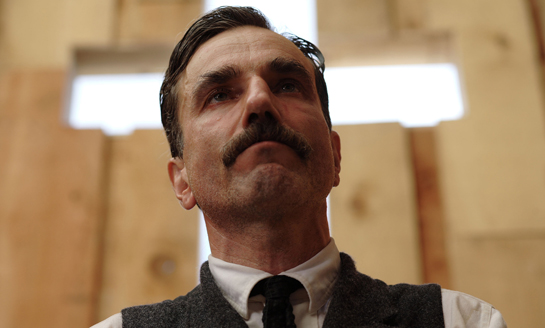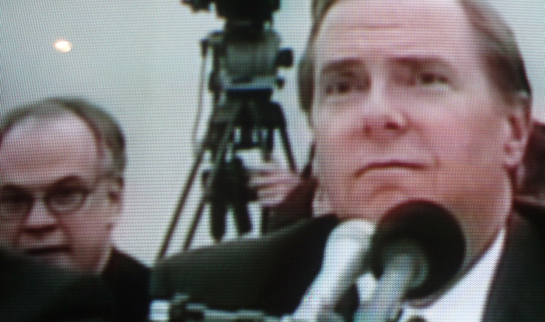
Wall Street : Get Rich or Die Tryin’
Commentary, Culture, Film, ReviewsWall Street: Money Never Sleeps is not a protest movie. What from the onset seemed like it would be a timely indictment of the white collar greed-heads that crashed the world’s biggest economy two years ago, in fact, isn’t. It is a melodrama set against the backdrop of big-balls trading, a story about romance and family and ambition and ego, held together by the big obvious message that money can be a corrupting influence.
It’s a frustrating film because we want something that’s angry, that holds people accountable for their monstrous crimes and grossly unethical behaviour. The first 20 promising minutes do just that; they appear to be predicating a bitter walk-through of the financial collapse from a perspective of intimacy, showing us the pain and deceit that crashed Titanic banks and drove people to take their own lives. It isn’t long though, before the laboured script relegates Wall Street to window dressing for a story about family and betrayal, in which metaphors for wealth and human relationships are made painfully literal.
Early in the film, Gordon Gekko (in one of many eye-rolling sequel winks) addresses a crowd at a speaking engagement and states “Someone reminded me I once said ‘Greed is good.’ Now it seems it’s legal.” Those are powerful words, but they aren’t supported by the film’s narrative arc, in which characters’ demises are solely caused by illegal practices. What exactly is this legal robbery that Oliver Stone wants us to be outraged about? The $70 million dollar Money Never Sleeps, distributed by goliath 20th Century Fox, flirts with anger, but often feels more like an episode of Entourage than a portrait of corruption as powerful as even the first Wall Street film, set in Patrick Bateman’s 80s.
So it begs the question, can Hollywood narrative films still do justice to the corrupting influence of wealth and greed? In a time of information overdosing and too much everything, can the crooked entertainment juggernaut of studio production, already perceived universally as bloodthirsty and purely economically driven, still make manifest the frustrations of the proletariat, or the evils of the financial autocracy that governs them? Money Never Sleeps is meant to be the very definition of such moviemaking, but falls well short, shackled by its own excesses and indulgences. I don’t believe, however, that it’s a lost art, and there have been (popular) films in the years since Charles Foster Kane kicked the can that have done just that.
As a portrait of human corruption, no film is darker, truer and more affecting than Paul Thomas Anderson’s 2008 masterpiece There Will Be Blood. Daniel Plainview’s merciless and brawny rise, at the expense of family, relationship, trust and dignity is a wretched tale, and pure in its delivery. It’s not bogged down by predictable third-act twists or cloying gimmicks, and the human melodrama that is inherent to the narrative serves the dark thematic principles, as opposed to distracting from them. Money Never Sleeps wishes for the same result, but is instead left with inconsistent characters and soap-opera clichés. Gordon Gekko and rival Bretton James live like sultans only until they are caught on the wrong side of the law; Daniel Plainview is held a lonesome prisoner of his ambition, a joyless slave to his vice. Gekko’s good guy/bad guy flips are distracting and redundant; the reality of Gekko’s world is interesting enough without these B-movie plot twists.
Of course, the truth is often stranger (and more rich) than fiction. Enron: The Smartest Guys in the Room is a brilliant dissection of corporate greed. The documentary boils the ludicrous and beyond-amoral practices of global Big Business down to the simple game that it is. It lets the average viewer, without needing any advanced understanding of economics or free-market regulations, really understand how these hallow, corrupt companies work. It’s devastating, but it is the human drama at the film’s core that is most incredible, with egos and lies and ambition beyond that of any script. The satisfaction one feels watching Kenneth Lay and Jeff Skilling gets their just dessert is almost euphoric.
And that’s the thing: there really are these cartoonishly-evil people in the world, people so fraught with greed that they are able to sacrifice humanity for the sake of ambition. They are powerful people, behind the curtain from the rest of us. We know that. We know that the world’s economy doesn’t just collapse because a lot of really honest people try their hardest to do the right thing. What we don’t know is who these people are and how they chewed their way through the world to achieve in such serious and often detrimental ways. We want to know how the system broke and how it can be fixed. Money Never Sleeps doesn’t shed much light, really, it just looks pretty and reminds us not to trust these people. Well it’s 2010, and we’re way beyond trust. We know a con when we see one, and we want our money back.


























